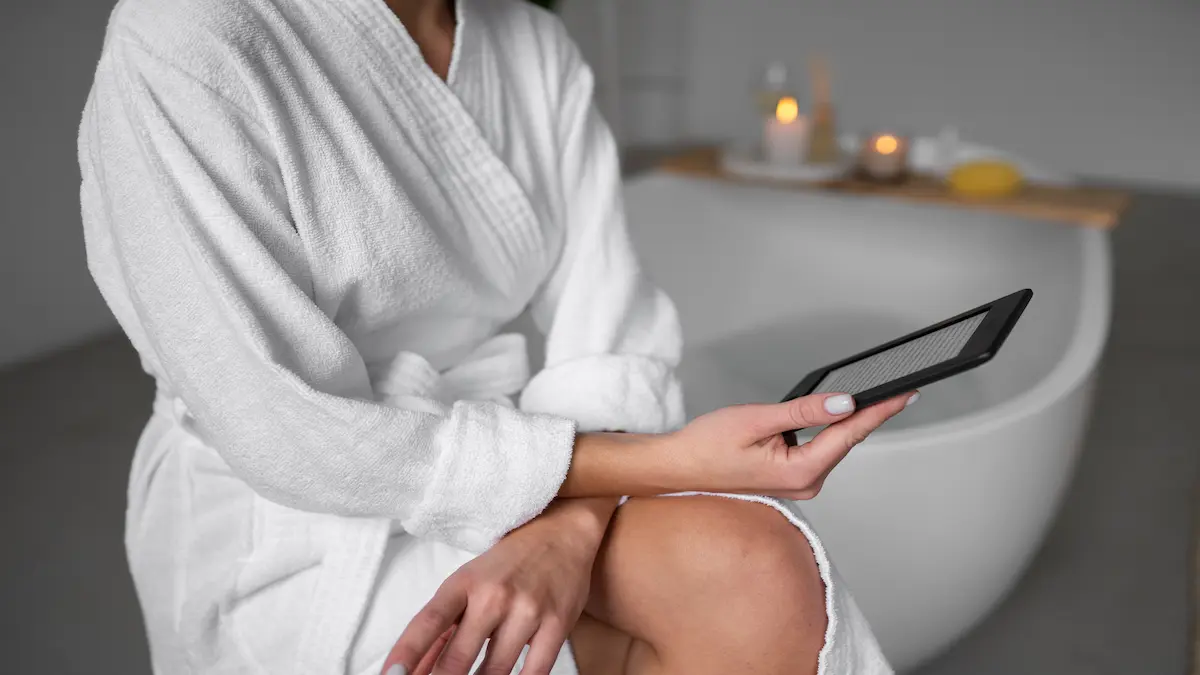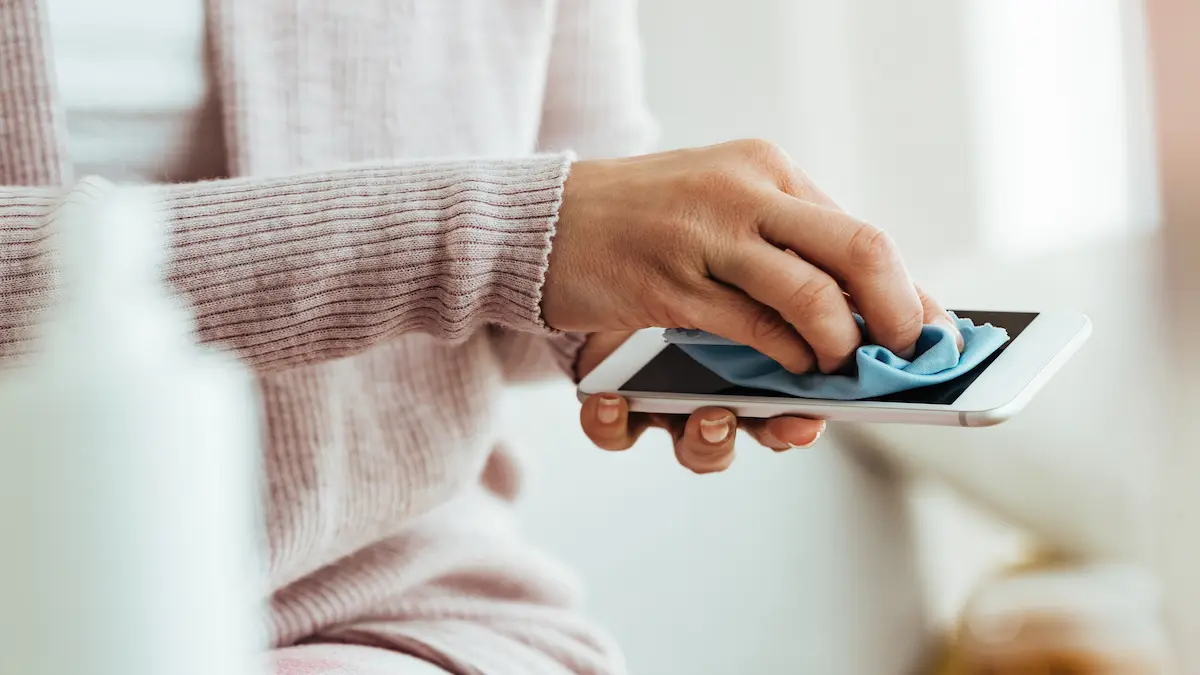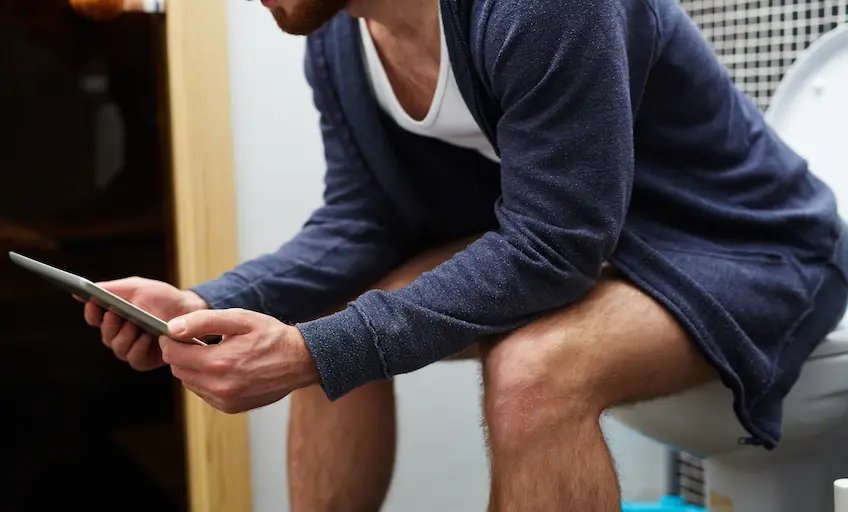We’ve all been guilty of it—some quick toilet scrolling on Instagram or WhatsApp that somehow turns into a full-blown scroll marathon. But what feels like harmless screen time can actually be messing with your health in ways you didn’t expect.
What happens when you scroll on the toilet?

That harmless habit of scrolling through social media while on the loo is not as innocent as it seems. From messing with your posture to increasing the risk of certain health issues, those extra minutes spent glued to your screen on the toilet can quietly take a toll on your body. Here’s what’s happening when your bathroom break turns into a scrolling marathon.
It can lead to hemorrhoids
Hemorrhoids are swollen veins in the anus, the lining of the anus, or the lower rectum. They occur when there is excessive pressure around the anus. This often results from prolonged sitting, especially on a toilet seat. Constipation, straining during bowel movements, and lifting heavy objects can also cause hemorrhoids.
The symptoms may include:
- Anal itching
- Bleeding from the anus
- Tender lumps near the anus
To prevent hemorrhoids, avoid sitting on the toilet for extended periods and straining to pass a bowel movement. Treatment options include over-the-counter pain relief, sitz baths (sitting in a shallow pan of warm water), and consuming adequate fiber and fluids each day.
It affects your posture and back
When you scroll on the toilet, you often lean forward with your head down—also known as “text neck.” This posture:
- Strains your cervical spine
- Leads to lower back pain
- Causes shoulder tension and muscular fatigue
Over time, you might experience:
- Chronic neck and upper back pain
- Slouched posture
- Nerve impingement
- Even herniated discs in serious cases
Bathrooms are not ergonomic spaces, and extended smartphone use there can increase spinal strain.
It weakens your pelvic muscles
The pelvic muscles support the bladder, intestines, and, in women, the uterus. Sitting on the toilet for long periods and straining to have a bowel movement can weaken these muscles.
When the pelvic muscles weaken, a range of symptoms may develop, including:
- Constipation
- Leakage of stool
- Urine leakage when laughing, coughing, or sneezing
- Painful urination
- Urgency to urinate
Regular exercise can strengthen the pelvic floor muscles. Consult a healthcare provider for exercises that target these muscles.
It messes with your bowel movements
Multitasking in the bathroom interrupts your body’s natural elimination process.
Here’s what happens:
- Your brain becomes distracted and isn’t fully focused on your bowel movement.
- You delay the reflex to push or relax correctly.
- As a result, you’re more prone to straining unnecessarily.
This can cause:
- Irregular bowel movements
- Incomplete evacuation
- Constipation
- Formation of hard stools and anal fissures
Adopting a mindful approach to toileting can prevent most of these issues.
Your phone is covered in germs

Using your phone in the bathroom exposes it to fecal bacteria and germs, which can then transfer to your face, food, and other surfaces.
Studies show:
- Phones can carry more germs than a toilet seat.
- E. coli, Staphylococcus, and Salmonella are commonly found on phones.
- Toilet paper may reduce hand contamination, but your phone doesn’t get any of that protection.
Risks include:
- Gastrointestinal infections
- Skin breakouts (acne from touching a contaminated phone to the face)
- Pink eye (conjunctivitis)
Washing hands is insufficient if you immediately re-touch a contaminated phone.
It overloads your brain first thing in the morning
Your body provides natural signals to indicate:
- When it’s time to go,
- When you’ve finished,
- And when to push or relax.
However, phone use overrides these signals by diverting your attention elsewhere. Over time, this dulls body awareness, resulting in:
- Disrupted circadian rhythms for elimination
- Missed bathroom cues
- Delayed responses to real-time bodily needs
This disconnection leads to chronic digestive problems in many individuals without their awareness.
Kids might pick up the same habit
Parents frequently give their phones to toddlers during potty training or when they want them to sit still. But this establishes a dangerous precedent.
Long-term consequences:
- Chronic constipation in children
- Delayed toilet training
- Lifelong association of the phone with toileting
- Attention disorders related to excessive screen time
It’s crucial to demonstrate healthy toilet habits from a young age.
How to stop scrolling on the toilet?
Changing the habit is achievable through small but deliberate steps.
Here are some practical tips:
- Leave your phone outside the bathroom. Out of sight, out of reach.
- Set a timer. Use a five-minute limit if necessary.
- Bring a book or magazine if you need to occupy your mind.
- Be mindful. Concentrate on the act of relieving yourself.
- Practise deep breathing. Swap scrolling for five calming breaths.
- Create a new reward system. Permit yourself to check your phone only after you’ve finished.
Quick recap
Scrolling on the toilet might seem like harmless downtime, but it can quietly wreak havoc on your body and habits. Here’s a quick reminder of why it’s worth breaking the scroll-and-sit cycle:
- Hemorrhoids happen when you sit too long and strain. Your phone isn’t worth the pain.
- Poor posture can develop over time, leading to issues with the neck, back, and spine.
- Pelvic muscles weaken with prolonged sitting, which can affect bladder and bowel control.
- Bowel movements get disrupted when you’re distracted, leading to constipation or incomplete elimination.
- Your phone becomes a germ hotspot, picking up bacteria that can affect your health.
- Your body loses touch with natural cues, especially when phone use is the first thing you do in the morning.
- Kids learn by watching you, so modeling better habits can help them avoid long-term issues.
Your body (and your phone) deserve a break. Keep scrolling out of the bathroom and keep your health in check. Your body, mind, and microbiome will thank you.
Frequently asked questions
Do you have questions about toilet scrolling and its impact? Here are some of the most common queries answered simply and clearly.
1. Is it really bad to use your phone on the toilet?
Yes, toilet scrolling can lead to health issues like hemorrhoids, poor posture, and disrupted bowel movements. It may seem harmless, but the longer you sit and scroll, the more strain you put on your body.
2. How does scrolling on the toilet cause hemorrhoids?
When you sit on the toilet for extended periods—especially while distracted by your phone—it increases pressure on the rectal veins, which can lead to hemorrhoids over time.
3. Can scrolling in the bathroom affect my mental health?
Yes. Constant phone use, even in the bathroom, can overload your brain, reduce mindfulness, and fuel digital dependency, contributing to stress and poor focus throughout the day.
4. Is it unhygienic to use your phone in the bathroom?
Absolutely. Your phone can pick up bacteria like E. coli and Salmonella, especially in a bathroom environment. These germs can transfer to your hands, face, and other surfaces, increasing the risk of infections.
5. What can I do instead of using my phone in the toilet?
Try deep breathing, practise mindfulness, or simply take a short break without distractions. If you need a distraction, opt for a book or magazine—but keep the phone out.
6. How long is too long to sit on the toilet?
Ideally, you should spend no more than 5–10 minutes on the toilet. Prolonged sitting increases the risk of hemorrhoids and strains your lower body muscles unnecessarily.
Key Takeaways
- Toilet scrolling can cause hemorrhoids, strain your back and posture, and disrupt your bowel movements.
- Sitting for too long can weaken pelvic muscles, potentially affecting bladder and bowel control.
- Leave your phone outside the bathroom, take a book or magazine if you need to stay occupied, and practise deep breathing to avoid scrolling.
Stay tuned to the Activ Living Community. Keep up to date with the latest health tips and trends through expert videos, podcasts, articles, and much more on nutrition, fitness, mindfulness, and lifestyle conditions like Asthma, Blood Pressure, Cholesterol, and Diabetes. Activ Living ke saath sahi sehat ki shuruat ABHI karo.
You may also be interested in the following blogs:
- How To Break A Phone Addiction: Mindful Living In The Digital Age
- Tips To Sanitize Your Mobile Phone During COVID-19
Popular Searches
How to lower blood pressure | Fruits good for liver | Unhealthy foods | Ragi Benefits | Basal Metabolic Rate | Acupressure points for High Blood Pressure | Ayurvedic medicine for blood pressure | How to control cholesterol at home | Homeopathy for Asthma | Biological Age | Home remedies for TB | Natural beta blockers | Negative effects of internet | Types of walking | Blood pressure calculator | Blood sugar calculator | BMI Calculator





 1800-270-7000
1800-270-7000







